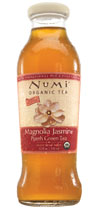
When brother and sister team Ahmed and Reem Rahim came up with the idea for Numi Organic Tea 10 years ago, they weren’t necessarily thinking about it as a beverage business. They were more excited about the chance to introduce a favorite childhood treat — Dry Desert Lime — to the American market. The Middle Eastern dried lime was the inspiration for one of the company’s first products, Dry Desert Lime, and began a series of tea innovations from the Oakland, Calif.-based company.
“We were inspired by a dry lime we drank as kids,” Reem Rahim says. “We’re from Iraq originally, and that tea we always thought was delicious and loved it, and thought what a great product to introduce to the states.”
“So it was kind of a whim in terms of an idea,” she says. “I don’t think we were necessarily thinking about a business initially, but sort of the idea that people would love this tea.”
At the time, Reem was an art student, while her brother was operating several tea houses in Europe, giving the idea of a tea business more traction.
“I was already deep into the herb and tea space, and growing more interest and awareness in it as I was visiting farms and learning about the nuances of teas and herbs,” Ahmed Rahim says. “I’ve always been a bit of an alchemist in some ways, blending herbs and trying different things, experimenting.”
Those roles have stayed with the two as the company has grown. Ahmed is responsible for the herb and tea blending at Numi, and Reem’s art adorns Numi’s product packaging.
“We wanted it to feel like a worldly, exotic, meditative feeling, so that’s kind of what the packaging wanted to inspire,” she says of the artistic renderings.
The company established a quality image early on, which included using full-leaf teas and only real fruit and herbs in its blends rather than natural or artificial flavorings.
“We use real freeze-dried fruits, real vanilla beans, real orange peel, real rose flowers,” Reem says. “Everything is real, so you get that really clean, authentic, pure flavor.”
The company also made a mark for itself as an early adopter of products such as rooibos and honeybush herbal teasans. Several years ago, it also introduced hand-sewn flowering teas to the market.
“Flowering tea became a big hit for us,” Reem says. “We introduced flowering tea about five years ago, and that got a lot of buzz and became a trend in the industry and a novelty, I would say. Those are hand-sewn tea leaves and they blossom when you steep them in water.”
This year, the company upped the innovation quotient, bringing the puerh (pronounced pu-er) tea variety to the United States. Like black, green, white and oolong teas, puerh comes from the Camellia sinensis plant, but it is a larger leaf variety and grows on taller tea trees rather than bushes. The tea is fermented during a 60-day process, giving it a robust flavor. Puerh contains high levels of antioxidants, and its monetary value and healthful properties both are reported to increase as it ages.
The company rolled out puerh in four tea bag varieties earlier this year, and it chose the relatively unknown tea variety for its first foray into ready-to-drink teas. The line launched this spring, and includes organic varieties such as Earl Grey, Magnolia Jasmine, Moroccan Mint, Peach Nectar, Mango Passion and Honey Lemon Rooibos Herbal Teasan.
Like the tea bag products, Numi’s ready-to-drink varieties are made from whole ingredients such as fruit purees, dried flowers and herbs, and they are lightly sweetened with organic honey, agave or evaporated cane juice.
While Numi’s tea bag products are available nationwide and in about 30 countries, the ready-to-drink products initially have smaller distribution, just within the United States.
“We’re testing it regionally with our current distribution model, mainly the West Coast, seeing how it does,” Reem says.
According to Ahmed, the ready-to-drink line put a spotlight on the company’s innovation and highlighted its organic and sustainable messages.
“The consistency of values stayed the same,” he says. “The consistency of quality stayed the same, the consistency of sustainability stayed the same, the health message stayed the same. All of it probably got accentuated even more because we’re the first to put puerh in a bottle. We’ve been able to carry the same messages as our tea bag line but really accentuate even more with being first in a bottle with all these different aspects.”
The Rahims both believe the U.S. tea category has room for additional creativity, and that consumers are more aware of tea’s possibilities, which gives the company license to experiment with new varieties.
“I always look at the marketplace first and see what is out there and what’s not out there, and I want to do what’s not out there, but still keep it really simple,” Ahmed says.
Reem adds: “Tea is a lot like wine. It has a lot of subtleties and nuances — the region where it grows and how it’s processed. It’s a very artisan approach to a beverage, similar to brewing beer, wine and coffee.
“More and more consumers will appreciate the pure taste of tea,” she says.